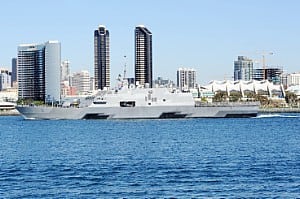A draft House defense appropriations bill would add a second Arleigh Burke-class (DDG-51) destroyer to the Navy shipbuilding budget and bar decommissioning three littoral combat ships.
The bill, released June 29, would provide $3.334 billion for two DDG-51s whereas the Biden administration’s FY ‘22 budget request sought only $2 billion for one ship in an effort to balance spending priorities given a limited funding topline (Defense Daily, May 28).
The Navy subsequently put the second destroyer, at a price tag of $1.66 billion, as its top unfunded priority in an annual list sent to Congress (Defense Daily, June 2).
According to a recent Congressional Research Service report published June 28, the unfunded priorities list figure of $1.66 billion is not the cost of the second destroyer itself, which alone would be about $2 billion. Instead it represents the net increase in shipbuilding funding needed to procure two destroyers rather than one. Adding the second ship reduces the estimated procurement cost of the first destroyer due to increased production economies of scale.
These destroyers are part of an FY 2018 to 20222 multiyear procurement contract that splits work between shipbuilders General Dynamics’ [GD] Bath Iron Works and Huntington Ingalls Industries’ [HII] Ingalls Shipbuilding. In 2018 the Navy awarded HII a $5.1 billion contract for six Flight III DDG-51s and GD a $3.9 billion contract for four other destroyers (Defense Daily, Sept. 28, 2018).
In the Navy’s FY ‘21 budget request it previously planned to procure two destroyers in FY ‘22 at a cost of $3.7 billion. If the service does not buy the second destroyer it would face a $33 million multi-year penalty in the contract for not sticking to the two ships per year order.
Members of the congressional defense committee have pushed back on procuring just one destroyer.
Navy officials said the decision to request only a single DDG-51 was an affordability issue. Chief of Naval Operation Adm. Mike Gilday told the Senate Appropriations Defense subcommittee that the service fought to keep the second destroyer until the end of the administration’s budget process but they had to balance it against investing in the current fleet given their topline (Defense Daily, June 25).

Officials also said the service plans to procure the second destroyer in FY ‘23, when the FY ‘21 budget request previously expected procuring only one ship.
Acting Secretary of the Navy Thomas Harker also said the service plans to sign another multi-year procurement contract for additional Flight III DDG-51s starting in FY ‘23 through FY ‘27.
The draft bill also bars any funding from being used to decommission the Lockheed Martin [LMT] odd-numbered Freedom-variant littoral combat ships USS Fort Worth (LCS-3), USS Detroit (LCS-7) or USS Little Rock (LCS-9).
This signals a strong disapproval of the Navy’s plan to divest from some of the LCS ships that are called either test platforms or beset by propulsion issues. The FY ‘22 budget request planned to decommission LCS-3, 4, 7 and 9 to save $186 million.
Budget documents argued LCS-3 and 4 were primarily test platforms and decommissioning them avoids the cost to upgrade them to configurations and capabilities of the rest of the fleet and adding mission packages. Last year Congress allowed the Navy to retire the first two LCSs, but no further hulls.
The Navy also argued it should decommission LCS-7 and 9 because of class-wide major combining gear issues and that repairing these two ships is not worth the repair costs over maintenance funds going to other work.
During the Navy budget request press conference in May, Deputy Assistant Secretary of the Navy for Budget Rear Adm. John Gumbleton expanded on why the service is looking to divest in LCS-7 and 9.
LCS-5 happened to just have a maintenance availability where they added a Naval Strike Missile, he said, noting “it’s getting ready for a deployment. And so we looked at, for the total of four to reinvest those funds across the FYDP, and 7 and 9 were the most suitable ships for that reason.”
In January, the Navy stopped accepting Freedom-variant LCSs due to a material defect with the combining gear and would not accept new ships until a design fix is in production and tested (Defense Daily, Jan. 22).